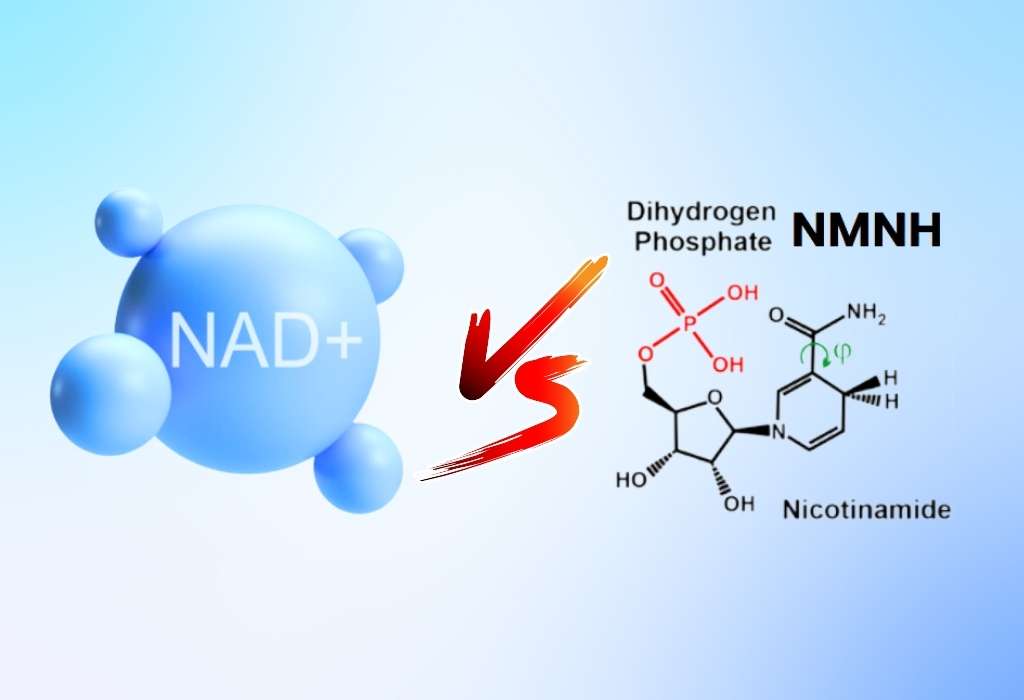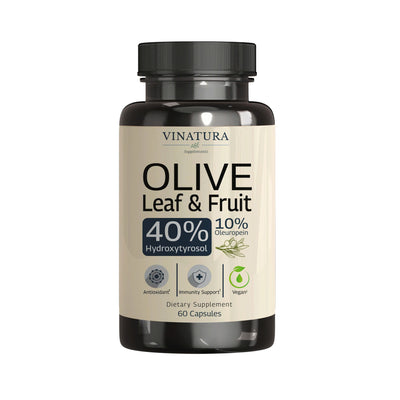
NAD vs NMNH: What's the Difference?
NAD+ vs NMNH are two compounds widely recognized by those seeking to boost metabolism, enhance cellular energy, and support both physical and mental health.
But what is the relationship between NAD+ and NMNH, how do they differ, and how do they affect human health? Let’s explore the answers in the following article.
Before exploring further, please read the disclaimer located at the end of this webpage.
Key Takeaways
- NAD+ and NMNH are compounds that help support both mental and physical health.
- NAD+ can regenerate energy and reduce aging, but it is difficult to absorb.
- NMNH can enhance NAD+ levels and inhibit certain unwanted cells, and it may be absorbed more effectively than NAD+
About NAD+
What Is NAD+?
NAD+, or nicotinamide adenine dinucleotide, is a coenzyme that plays a crucial role in redox reactions. This process facilitates electron transfer between molecules, enhancing the body's energy metabolism and supporting vital functions.
Additionally, NAD+ serves as a necessary cofactor for enzymes not directly involved in redox reactions, such as sirtuins, CD38, and poly(ADP-ribose) polymerase [1][2]. These enzymes contribute to important functions like regulating aging processes and DNA repair, which, in turn, help improve overall health.
How Does NAD+ Work?
NAD+ works by directly or indirectly influencing many important cellular functions, including metabolic pathways, chromatin remodeling, DNA repair, cellular aging, and immune cell function.
Numerous studies show that NAD+ contributes to extending lifespan and provides benefits in supporting improved neurodegenerative diseases and certain infections. Additionally, boosting NAD+ helps reduce calorie intake and improves metabolic health [1] [2].
About NMNH
What Is NMNH?
NMNH, or Dihydronicotinamide mononucleotide, is the reduced form of nicotinamide mononucleotide (NMN), a precursor of NAD+. Research has suggested that NMNH may have a greater impact on NAD+ levels compared to NMN in both in vitro and in vivo studies, primarily through its interaction with the enzyme NMNAT [4].
How Does NMNH Work?
NMNH works by increasing NAD+ and NADH (the reduced form of NAD) levels in cells. Metabolic analysis shows that NMNH can inhibit glycolysis and the citric acid cycle, two crucial processes in cellular energy production, helping to enhance cell regeneration and protect cells from the inside [3] [4].
NAD+ Vs NMNH: What's The Difference?
Both NAD+ and NMNH are compounds related to energy metabolism and play important roles in the aging process. However, these two compounds differ in their chemical forms and mechanisms of action as follows:
- NAD+: A key coenzyme in oxidation-reduction reactions, helping cells convert energy and participating in essential functions such as DNA repair and regulating cellular aging.
- NMNH: The reduced form of NMN, a new precursor of NAD+ that can boost NAD+ levels more effectively than NMN in studies. In addition, NMNH also helps increase NADH levels, the reduced form of NAD+.
Physical Benefits of NAD+ vs NMNH

Overall, both NAD+ and NMNH hold significant potential for physical health, especially in combating aging processes such as muscle degeneration, diabetes, and metabolic disorders, with more specific effects as follows:
- NAD+: Maintains cellular energy levels, protects cells from aging-related damage, and helps sustain muscle function and endurance.
- NMNH: Boosts NAD+ levels, improves cellular health, and inhibits metabolic processes such as glycolysis and the citric acid cycle. This helps reduce the growth of harmful cells and supports weight management, muscle health, and metabolic stability.
Mental Benefits of NAD+ vs NMNH
NAD+: Plays an important role in maintaining neurological health by repairing DNA in brain cells, improving cognitive function, and protecting nerve cells.
Supplementing with NAD+ provides benefits such as improving memory and focus, reducing cognitive decline, and neurodegenerative diseases like Alzheimer's and Parkinson's in older adults.
NMNH: NMNH is relatively new, and there is not as much specific research on its effects on mental health as there is with NAD+. However, by boosting NAD+ levels in the body, NMNH indirectly offers similar benefits in protecting the brain and nervous system.
What Should I Choose Between NAD+, NMNH And NR Supplements?

To choose between NAD+, NMNH, or NR supplements, let’s clarify the differences between them:
- NAD+: This compound is directly involved in the energy exchange processes of cells. However, taking NAD+ supplements directly may be less effective due to its large molecular size, which makes it difficult to absorb through the digestive system.
- NR: As a precursor of NAD+, NR is converted into NAD+ through a recycling pathway. It helps boost NAD+ levels, supports cellular health, and enhances energy exchange. NR works gradually, so if you’re looking for quicker effects, you may need to consider NMNH or higher doses of NR.
- NMNH: Known as the reduced form of NMN, NMNH is relatively new but has shown greater effectiveness in boosting NAD+ levels. NMNH operates via an independent metabolic pathway, enhancing both NAD+ and NADH levels, which helps improve cellular energy.
Choosing the right supplement:
- If you want to directly supplement NAD+, you can opt for NAD+ products but should be mindful of their absorption limitations.
- If you prefer a gradual and mild improvement in cellular health and energy levels, NR is a suitable option.
- If you need a supplement with a stronger and faster impact, offering both enhanced NAD+ levels and improved cellular growth, NMNH is the optimal choice.
How To Naturally Maintain Healthy NAD+ Levels
To maintain NAD+ levels naturally, you can regularly adopt the following habits: Exercise and engage in various physical activities; Include NAD+-boosting foods in your diet, such as chicken, vitamin B2, dairy, oats, vegetables, and more; Get enough sleep and avoid frequent stress; Drink plenty of water, limit alcohol consumption, and avoid excessive sun exposure; Use supplements responsibly…
Conclusion
Based on the information provided in this article, I am sure you have recognized the differences between NAD+ and NMNH in terms of their mechanisms of action as well as their potential benefits for improving mental health and enhancing physical well-being.
If you have no further doubts, consider using NAD+ or NMNH now to experience the optimal benefits they offer.
References
- [1] Covarrubias, A. J., Perrone, R., Grozio, A., & Verdin, E. (2021). NAD+ metabolism and its roles in cellular processes during ageing. Nature reviews Molecular cell biology, 22(2), 119-141. https://www.nature.com/articles/s41580-020-00313-x
- [2] Belenky, P., Bogan, K. L., & Brenner, C. (2007). NAD+ metabolism in health and disease. Trends in biochemical sciences, 32(1), 12-19. https://www.cell.com/ajhg/abstract/S0968-0004(06)00323-9
- [3] Liu, Y., Luo, C., Li, T., Zhang, W., Zong, Z., Liu, X., & Deng, H. (2021). Reduced nicotinamide mononucleotide (NMNH) potently enhances NAD+ and suppresses glycolysis, the TCA cycle, and cell growth. Journal of Proteome Research, 20(5), 2596-2606. https://pubs.acs.org/doi/abs/10.1021/acs.jproteome.0c01037#
- [4] Liu, Y., Luo, C., Li, T., Zhang, W., Zong, Z., Liu, X., & Deng, H. (2020). Reduced Nicotinamide Mononucleotide (NMNH) Potently Enhances NAD+, Causes Reductive Stress, and Suppresses Glycolysis and Cell Growth. bioRxiv, 2020-11. doi: 10.1021/acs.jproteome.0c01037
Author

Product Disclaimer
Including an ingredient or study does not evaluate, endorse, or recommend any Vinatura product or any third-party product. Some ingredients discussed may not be used in any Vinatura product.
The content of the articles has not been evaluated by the Food and Drug Administration (FDA) and is not intended to promote or endorse any specific product. Any products sold on this website are not intended to diagnose, treat, cure, or prevent any disease.
Opinions and Endorsements
Any claims, statements, or opinions expressed in the articles are those of the author(s) and do not necessarily reflect the views or opinions of the manufacturers of the dietary supplement products. The products sold on this website are separate from the content of the articles and are not directly endorsed or associated with the information presented here.
Liability Disclaimer
The author(s) of the articles, website, and manufacturers of the dietary supplement products do not assume any liability for any potential consequences arising from the use of the information provided in the articles. Ingredient effects, dosages, and safety vary by individual, formulation, and context; some ingredients interact with medications or may be unsuitable during pregnancy or lactation. It is recommended that individuals consult with a qualified healthcare professional before making any dietary or lifestyle changes, including the use of dietary supplements.
Product Usage
Please refer to the product labels and packaging for specific usage instructions and guidelines for the dietary supplement products sold on this website.
Customer Support
For any concerns or questions regarding the dietary supplement products, please contact our customer support team, who will be more than happy to assist you.





Leave a Comment
Be the first to comment.
What do you think?